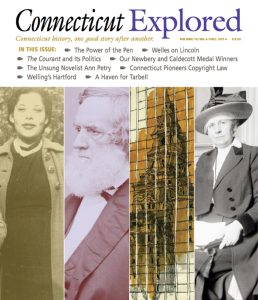By Elizabeth J. Normen
(c) Connecticut Explored Inc. Fall 2014
Subscribe/Buy the Issue!
 It’s starting to feel a bit like the Wild Wild West out there. And I’m not talking about gun control. I’m referring to the apparent relaxing of standards by some publications (in print and on the Web) and writers that suggests a shocking disregard for attribution of sources. Citing sources is important. Apart from the obvious plagiarism concerns, it ensures that the hard-working historian who invested countless hours to unearth and interpret the information gets credit for it, and it helps readers discern whether the information they are reading can be trusted.
It’s starting to feel a bit like the Wild Wild West out there. And I’m not talking about gun control. I’m referring to the apparent relaxing of standards by some publications (in print and on the Web) and writers that suggests a shocking disregard for attribution of sources. Citing sources is important. Apart from the obvious plagiarism concerns, it ensures that the hard-working historian who invested countless hours to unearth and interpret the information gets credit for it, and it helps readers discern whether the information they are reading can be trusted.
As a public history magazine, not a scholarly journal, Connecticut Explored does not use footnotes. But we do require our writers to cite sources in the text of their stories. Sometimes that can be a bit cumbersome, but we do it for the reasons cited above. We’ve recently had a spate of issues with other authors and publications who have freely drawn upon research presented in our pages without fully acknowledging our author and article as a source, thus creating the mistaken impression that the ideas and material they presented were discovered by them and are theirs alone. Professional standards exist; we follow the Chicago Manual of Style. It states: “With all reuse of others’ materials, it is important to identify the original as the source. This not only bolsters the claim of fair use but also helps avoid any accusation of plagiarism.”
Even Wikipedia—itself sometimes questioned for its validity as a source—has a policy for its contributors: “By citing sources for Wikipedia content, you enable users to verify that the information given is supported by reliable sources, thus improving the credibility of Wikipedia while showing that the content is not original research. You also help users find additional information on the subject; and you avoid plagiarising the source of your words or ideas by giving attribution.” Well said.
Our first choice is to get the historians who have done the primary research on the topic at hand to write stories for us. But even so, as part of the editing process, we not only require authors to cite sources but to include dates, places, and proper names, and we spot check for accuracy. We also try to read for bias—that is, inferences an author might make about an historical figure’s motivations, for example, that might be colored by our 21st-century point of view, or gender, or race, or a broad generalization about the practices of the time. It’s tempting to fill in the blanks left by the historical record, but if the historic figure didn’t record his or her reason for doing something, we’re reticent to have the author jump to a conclusion without making it clear it’s a speculation.
Of course, none of this is to suggest that errors don’t slip through. When a reader finds one, we appreciate its being called to our attention so we may run a correction. That process contributes to the historic record and may help future writers get their stories straight.
We agree with Wikipedia that there’s another reason for citing sources: so that you can dig further into a topic yourself. For every story we offer, there’s either a book-length treatment already published—or there should be. We hope that articles in Connecticut Explored might lead you on a fascinating journey of discovery. When you write up your findings—for a book, an article, your blog, or even a Facebook post—as a courtesy and a matter of ethics, just be sure to credit the author and the publication that started you on your way. Our hard-working historians will be grateful.
Please be our Friend!
Please give to our Friends campaign this fall. Friends of Connecticut Explored make contributions above and beyond their subscription dues, and that support is critical to our ongoing publication and programming with our partners. Watch for a letter in the mail this fall or visit ctexplored.org/subscribe/friends-of-connecticut-explored/.
Read the Issue!
